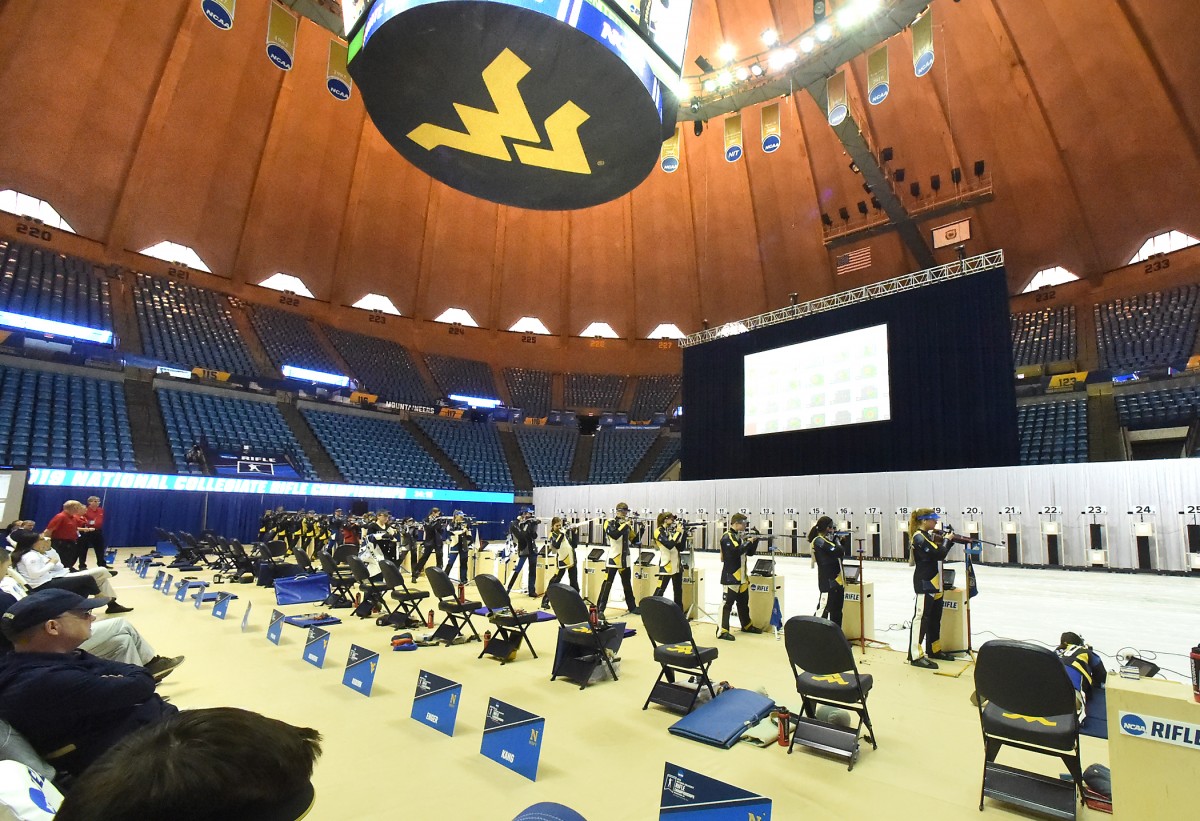MORGANTOWN — The pops of shots echoed throughout the concrete insides of the WVU Coliseum on Friday as 14 schools descended on Morgantown for the NCAA Rifle Championships — the first time West Virginia hosted an NCAA championship event.
WVU won six of the last 10 championships, including five of the last six, so it seemed fitting for the Coliseum to play host.
But long before West Virginia became known as a national powerhouse program, Bruce Meredith gathered underneath Old Mountaineer Field at a small, cramped shooting range. Wearing old leather jackets, Army boots and camouflage, shooting a .22 Winchester Model 52s, and laying on a mattress, Meredith is happy to see how far the sport has come.
“Now, they have shooting pants, shooting gear, shooting shoes and are using guns that cost about $10,000,” he said. “This has all come up to a phenomenal level now. We had no scholarships then, but they do now.
“It’s come a long, long way, and I’m thrilled to see it take off. Those of us from back in the day are jealous from where it is now.”
Meredith, 82, originally of Wheeling now living in Georgia, knew he had to make the trip north when he found out WVU was hosting the NCAA championships. It felt like things came full circle, as Meredith, the first individual champion in school history, was in attendance.
He was also a member of the Mountaineers’ first team championship in 1961.
Rifle became an NCAA-sanctioned sport in 1980, so while WVU was a member of the Southern Conference in the early 1960s, shooting was under by the National Rifle Association.
“That lit a spark, where some people were like, ‘I want to shoot with a national team,’ ” Meredith said. “A couple of years after we won one, they won another, then another, and the program continued to keep growing and you’ve got what you see today.”
West Virginia has claimed 19 national titles since the NCAA adopted rifle nearly 40 years ago, but the NCAA does not recognize the three WVU won under the NRA, including the first, claimed by Meredith.
Financially, the rifle team was funded primarily by the Army ROTC, which Meredith was the cadet commander prior to his graduation. The ROTC supplied vans for travel and non-commissioned officers would buy lunch.
Equipment supplied, in comparison to today’s sport, was archaic.
“We were dinosaurs back then,” Meredith said. “We did the best we could with what we had, but we were slumming it a lot of the time.”
Following graduation, Meredith joined the Army but continued to shoot competitively. He competed in target shooting with the ARADCOM team at Forts MacArthur, Carson and Niagara that won the 1,000-yard 1963 national championship at Camp Perry, firing the M-1 Garand rifle. He was senior officer of the Eighth Army (Korea) and U.S. Army Pacific (Hawaii) teams and was assigned to the All-Army team at Fort Benning, Ga., in 1965, being awarded the Distinguished Rifleman Badge and the President’s Hundred Tab. He holds the same honors with the .45 caliber pistol.
Meredith was recruited to the U.S. Army International Rifle Team, where he won the 1967 National Smallbore Prone Individual title at Camp Perry with a national record of 6396 and fired the first ever-perfect score of 3200 with telescopic sights.
While coaching the Army Reserves team that he started, he had several “world class shooters,” including a few that were in attendance Friday.
TCU coach Karen Monez was added to Meredith’s team as a private in the 1970s. Navy head coach Mike Anti, Army head coach Web Wright and Air Force assistant David Johnson also shot under Meredith.
“I’m very pleased to know these people,” he said. “I can now say, ‘Hey, I was part of their history,’ which is pretty neat.”
After winning several other military championships, and upon his retirement, Meredith qualified for four Olympic games — Seoul (1988), Barcelona (1992), Atlanta (1996) and Sydney (2000).
His final competitive meet was in the 2002 World Championships in Finland at age 62.
“I look back and was blessed to be able to do it as long as I did,” Meredith said.
TCU, WVU tied heading into Saturday
Smallbore was the focus Friday with a set of relay matches followed by the individual final. West Virginia’a David Koenders (586), Ginny Thrasher (586) and Morgan Phillips (584) each qualified for the individual finals.
Top-seeded Elizabeth Marsh of TCU shot a 588 and eventually captured the individual smallbore title with a 588.
The Horned Frogs and Mountaineers finished with a 2331 score, but TCU claimed the national team title due to hitting more center shots, 127-112.
WVU’s David Koenders finished third at 586, while Thrasher was fifth at 586 and Phillips was seventh at 585.
“The biggest message is that we really just start tomorrow — it’s a new day and a new competition,” WVU coach Jon Hammond said. “We would say that whether we were 10-20 points behind or 10-20 points ahead. It just so happens that we are tied and it’ll be based on tomorrow.”
Competition continues today, with the first air rifle relay call to the line set for 9:45 a.m. Individual air rifle finals will begin at 2 p.m. and an award ceremony for team and individual honors set for about 3:45 p.m.




